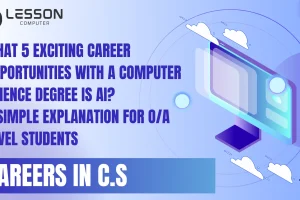
Can Online Computer Science Courses Improve Your Problem-Solving Skills for Exams?
In recent years, online education in Mauritius has transformed the learning landscape across numerous fields, and computer science stands out as a significant area of growth. Numerous platforms such as Coursera, edX have emerged, offering an array of online computer science courses that cater to a diverse global audience. These courses are not only accessible and flexible but also affordably priced, making it easier for learners from various backgrounds to participate in high-quality education.
In addition to teaching essential concepts like programming languages, algorithms, and software development, these online courses often delve deeper into critical thinking and analytical skills. One of the most valuable aspects of computer science education is its focus on problem-solving skills, which serve as a foundation for academic achievement and professional development.
Problem-solving is an essential competency in today’s educational system and workplace, particularly in situations that demand creative solutions to complex issues. Exams frequently assess these abilities, testing students’ capacity to think critically, reason logically, and analyze information effectively. Through engaging with online computer science coursework, students can refine these vital problem-solving skills in several ways.
Courses often incorporate hands-on projects and real-world applications, allowing learners to apply theoretical knowledge to practical challenges. This experiential learning process enhances their ability to navigate problems and develop innovative solutions. Furthermore, interactive elements such as quizzes, collaborative group work, and discussion forums foster a deeper understanding of concepts and encourage students to think outside the box.
This article will explore how participating in online computer science courses not only bolsters students’ technical proficiency but also significantly enhances their problem-solving capabilities, ultimately positioning them for success in both academic assessments and future careers.
Understanding Problem-Solving in Computer Science:

Computer science is all about tackling intricate challenges with a well-organized and methodical approach. At its heart, it’s like piecing together a puzzle, where each step brings us closer to a solution. This fascinating field invites us to explore, innovate, and devise strategies that not only solve problems but also pave the way for new possibilities.
1. Finding the problem:
Understanding the root cause of an issue and defining the requisite requirements are essential components of effective problem-solving. By accurately pinpointing the source of a problem, one can develop targeted solutions that not only resolve the issue but also promote a smoother workflow. This clarity sets the stage for increased productivity and a more streamlined approach to achieving objectives.
2. Breaking down the problem:
Breaking things down into smaller, manageable tasks can be a game-changer! When you tackle your goals in bite-sized pieces, everything feels more attainable. It’s not just convenient—it makes the whole process smoother and far more enjoyable. Embrace this approach, and watch how much easier and more efficient your journey becomes!
3. Developing a solution strategy:
Tackling challenges begins with crafting effective algorithms or logic. Once you gain insight into a situation, the next crucial step is to develop a strategic plan that guides you through various tasks. By designing a comprehensive plan, you’ll uncover essential elements to consider, allowing you to navigate your objectives with confidence and clarity. Let’s turn your insights into actionable steps!
4. Implementing the solution:
Bringing the strategy to life by transforming it into code and actionable steps!
5. Testing and refining:
Identifying errors is essential, optimizing performance is non-negotiable, and ensuring correctness is imperative.
This step-by-step method for tackling problems is highly effective across various fields, not limited to technical issues. It is particularly beneficial for students preparing for academic exams in subjects that require logical reasoning, such as mathematics, engineering, and the sciences. In these subjects, having a structured approach allows students to break down complex problems into manageable parts, making it easier to find solutions.
Online computer science courses play a crucial role in enhancing these problem-solving abilities. These courses employ a range of tools and teaching methods designed to engage students and promote critical thinking. Through interactive exercises, real-world examples, and collaborative projects, learners can practice and refine their skills, leading to a deeper understanding of the material. This holistic approach not only prepares students for exams but also equips them with valuable skills for their future careers.
Key Benefits of Online Computer Science Courses in Problem-Solving Development:

1. Interactive Problem-Solving Exercises
Online courses help learners solve real problems through hands-on activities. For example:
Dive into the exciting world of algorithmic challenges with platforms like LeetCode, HackerRank, and Codeforces! These dynamic sites not only push you to think critically but also inspire you to craft optimized solutions, transforming learning into an exhilarating adventure. Join the community and watch your programming skills soar!
Many online computer science courses go beyond mere lectures by incorporating an array of interactive elements such as quizzes, programming assignments, and real-world projects. These components are not just exercises; they are dynamic learning experiences designed to actively engage learners and foster deep understanding.
Interactive practice not only builds confidence but also develops resilience in tackling unfamiliar problems, which can be critical during exams.
2.Experience with a Variety of Problem Types
Online courses offer a wide variety of challenges, from basic programming tasks to advanced problems with data structures and algorithms. This variety helps learners build strong problem-solving skills and prepares them for different kinds of questions in exams. Here’s how:
A step-by-step guide:
Learn a Wide Range of Skills:
- To begin your programming journey, start with simple tasks that lay the foundation for your skills. For instance, you might begin by sorting a list of numbers or writing basic programs that perform fundamental operations, such as addition or data input and output.
- Once you feel comfortable with these introductory tasks, gradually increase the complexity of the challenges you tackle. This could involve optimizing algorithms, where you learn to make existing code more efficient, or designing data structures such as arrays, linked lists, and trees, which are essential for organizing and managing data.
- Each step of this progression is designed to build upon your previous knowledge, enhancing your problem-solving abilities. As you master each level, you’ll gain the confidence necessary to approach and solve more intricate and demanding programming challenges.
Build a Problem-Solving Toolkit:
- Encountering a variety of problem types enhances your ability to address challenges effectively. This experience allows you to develop skills in recognizing patterns across different situations, which is crucial for identifying underlying issues.
- Additionally, it sharpens your capacity to analyze specific requirements, enabling you to assess what is needed for successful resolution. As you adapt your solutions to fit diverse scenarios, you learn the importance of flexibility and creativity in problem-solving, ultimately equipping you with a robust toolkit to tackle future challenges.
Think Creatively and Critically:
- When you confront a variety of challenges, you enhance your ability to think critically and creatively about problem-solving. This means that with each new obstacle you encounter, you develop a broader perspective and a wider range of strategies to address issues. Such cognitive flexibility is particularly beneficial when tackling complex exam questions, as these often demand not just a standard approach but also innovative thinking to arrive at effective solutions.
- By honing this skill through diverse experiences, you can improve your performance in high-pressure situations, such as exams, where out-of-the-box thinking can make a significant difference in your results.
Prepare for Unexpected Questions:
The world of online courses offers an exciting variety that keeps you adaptable and prepared for any curveballs that may come your way in exams. Think of it like training for a sport—by honing your skills in different scenarios, you boost your confidence and readiness when it’s time to tackle those tests!
3. Real-Time Feedback and Iterative Learning:
Enhanced Understanding and Knowledge Retention:
1: Pinpointing Errors:
Students are able to swiftly pinpoint the underlying causes of their mistakes, which allows them to grasp the fundamental issues that led to those errors. This understanding not only clarifies where things went wrong but also equips them with the knowledge to avoid making the same missteps in future assignments or exams. By addressing the root of their misconceptions, they enhance their learning process and build a stronger foundation for their academic success.
2: Clarifying Misconceptions:
Immediate feedback plays a crucial role in the learning process, as it provides students with the opportunity to clarify any misconceptions related to concepts or instructions. By receiving timely responses, learners can adjust their understanding and correct their thought processes on the spot, enhancing their grasp of the material and fostering a more effective learning environment. This dynamic interaction not only aids in reinforcing correct information but also supports students in developing critical thinking skills as they navigate through their educational journey.
3: Reinforcing Correct Learning:
Positive feedback is like a booster shot for students’ confidence! It not only confirms their understanding but also inspires them to dive deeper and explore even more. By celebrating their successes, we create an environment where curiosity thrives and learning becomes an exciting adventure!
Improved Problem-Solving and Critical Thinking Skills:
1: Stepwise Learning:
Students have the exciting opportunity to explore various problem-solving techniques, tap into valuable feedback on their strategies, and fine-tune their methods for even better results. It’s a dynamic process of discovery and improvement that fuels their learning journey!
2: Developing Metacognitive Skills:
Receiving immediate feedback plays a crucial role in the educational journey of students. It prompts them to take a step back and engage in thoughtful reflection about their own learning processes. By examining their strengths and weaknesses in real-time, students can pinpoint specific areas where they need to improve. This reflective practice not only aids in their self-awareness but also encourages the development of effective learning strategies tailored to their unique needs. Consequently, immediate feedback acts as a catalyst for deeper understanding and growth in their academic pursuits.
3: Building Resilience
When students face challenges and actively seek feedback to navigate through them, they not only conquer obstacles but also build resilience and cultivate a growth mindset. This journey transforms their approach to learning, turning setbacks into stepping stones for success!
Increased Engagement and Motivation:
1: Sense of Progress:
Receiving regular feedback provides a sense of accomplishment and motivates students to continue learning and improving.
2: Personalized Learning:
Immediate feedback can be tailored to each student’s individual needs, providing a more personalized and effective learning experience.
3: Reduced Anxiety:
Knowing that they can quickly identify and correct mistakes reduces anxiety and increases student confidence in their abilities.
Better Exam Preparation:
1: Practice Self-Assessment:
Providing immediate feedback on assignments helps students practice self-assessment, enabling them to identify weaknesses and tailor their exam preparation accordingly.
2: Improved Exam Performance:
Utilizing feedback received on assignments allows students to enhance their understanding and skills, ultimately enabling them to approach exam questions with greater confidence and precision.
3: Reduced Test Anxiety: .
Consistent practice with feedback can alleviate test anxiety by enhancing confidence and familiarity with question types and performance expectations.
4. Gamification and Motivation:
Many online learning platforms have begun to incorporate gamification techniques to enhance the educational experience. This approach often involves the use of leaderboards, badges, and competitive programming contests, which collectively create an engaging and interactive environment for learners.
Gamification serves several important purposes in education:
1: Enhanced Engagement and Motivation:
By introducing elements of competition and achievement, learners are more likely to stay engaged and motivated. The thrill of earning badges or climbing a leaderboard can encourage students to log in more frequently and practice consistently, turning study sessions into an enjoyable activity rather than a chore.
2: Stress and Time Management Simulation:
Gamified learning environments can simulate the high-pressure scenarios that students often face during exams. By participating in timed quizzes or contests, students gain valuable experience managing stress and allocating their time effectively. This can lead to improved performance in real-life situations, as they learn to think on their feet and make quick decisions under pressure.
Overall, gamification not only makes learning more enjoyable but also equips students with essential skills that benefit them beyond the classroom.
5. Access to Expert Guidance and Peer Collaboration:
- Online courses commonly provide access to content delivered by industry experts, along with interactive community forums where students can connect and engage with one another. The benefits of participating in these courses are numerous and impactful.
- One significant advantage is the opportunity to learn advanced problem-solving techniques directly from seasoned instructors who bring a wealth of experience and expertise to the table. Their insights can help students develop a deeper understanding of complex concepts and foster critical thinking skills.
- In addition, these courses encourage collaboration among peers, allowing students to tackle problems together. This collaborative approach not only enhances individual perspectives but also promotes the exchange of diverse ideas and strategies, enriching the learning experience for everyone involved.
- Furthermore, by exposing students to a variety of methodologies for addressing the same problem, online courses provide invaluable preparation for exams that require creative thinking and adaptability. This exposure helps students build a versatile toolkit of techniques that they can apply in different scenarios, boosting their confidence and performance in high-stakes situations.
6. Flexibility for Consistent Practice:
Online learning boasts one of its most remarkable features of flexibility. With this approach, students have the incredible opportunity to:
· Learn at their own pace:
Dive deep into challenging topics without the pressure to keep up with a fast-paced classroom.
· Integrate problem-solving practice seamlessly into their routines:
This allows for consistent practice, which is essential for truly mastering new skills.
· Make the most of their downtime:
Transform those idle moments into productive learning sessions, turning even brief pauses into valuable opportunities for growth.
Embrace the power of online learning and discover how it can fit perfectly into your lifestyle!
How Problem-Solving Skills Translate to Exam Success:
1. Enhanced Logical Reasoning:
Logical reasoning serves as a foundational element in various academic disciplines, particularly in fields such as mathematics, science, and computer science. Online courses in these subjects are designed to equip students with essential skills that enhance their problem-solving capabilities.
These courses focus on teaching students how to effectively recognize patterns and relationships within complex problems. By identifying these patterns, learners can better understand the underlying structures of the problems they encounter. Additionally, students are trained to apply logical reasoning systematically and methodically, which is crucial for arriving at accurate solutions.
The practical applications of these skills are particularly evident in examinations that involve mathematical proofs, derivations, or coding challenges in programming. Mastering logical reasoning not only aids in navigating these specific assessments but also fosters a deeper understanding of the concepts that underpin these fields, ultimately enhancing academic performance and critical thinking abilities.
2. Improved Time Management
Many online platforms incorporate time-bound challenges, preparing students for timed exam environments. These challenges teach students to:
- Organize tasks according to their difficulty and the time available to complete them.
- Create strategies for effectively allocating time among different questions.
3. Structured Thinking for Writing Exams
Structured thinking is a hallmark of computer science training. It helps students:
- Organize their thoughts clearly and logically when answering essay or long-form questions.
- Use diagrams, flowcharts, and pseudocode to present solutions systematically.
4. Attention to Detail
Debugging exercises in programming enhance attention to detail, enabling students to:
- Spot errors or inconsistencies in their exam answers.
- Verify solutions before submission, minimizing careless mistakes.
5. Resilience in Tackling Complex Problems
Computer science teaches persistence through iterative problem-solving. This builds resilience, allowing students to remain calm and composed even when faced with challenging exam questions.
Overcoming Challenges in Online Learning:

While online courses offer immense benefits, they come with challenges, such as:
1. Motivation:
Self-paced courses require discipline. Setting clear goals and following a schedule can help.
2. Screen Fatigue:
Balancing screen time with offline study and physical activity is essential.
3. Choice Overload:
With many courses available, choosing the right one can be daunting. Researching course reviews and starting with beginner-friendly content is a good strategy.
Conclusion:
Online computer science courses from Lessons Computer serve as effective resources for cultivating essential problem-solving skills that extend well beyond programming itself. These programs promote logical reasoning, structured thinking, and resilience—traits that are vital for academic success. Through a combination of interactive exercises, diverse challenges, real-time feedback, and expert guidance, these courses provide students with the analytical skills necessary to address complex exam questions.
For those looking to improve their academic performance, online computer science courses in Mauritius offer a valuable opportunity. They combine the flexibility of digital learning with the discipline of traditional problem-solving approaches, making them an excellent choice for students aiming to advance their skills and knowledge. We’d love for you to join us in our online tuition courses in Mauritius from grade 7-9 and O/A levels offered by Lesson Comouter. It’s a fantastic way to gain quality knowledge and boost your skills! Come on in and enroll—let’s learn together!
Discover more from Lesson Computer
Subscribe to get the latest posts sent to your email.



